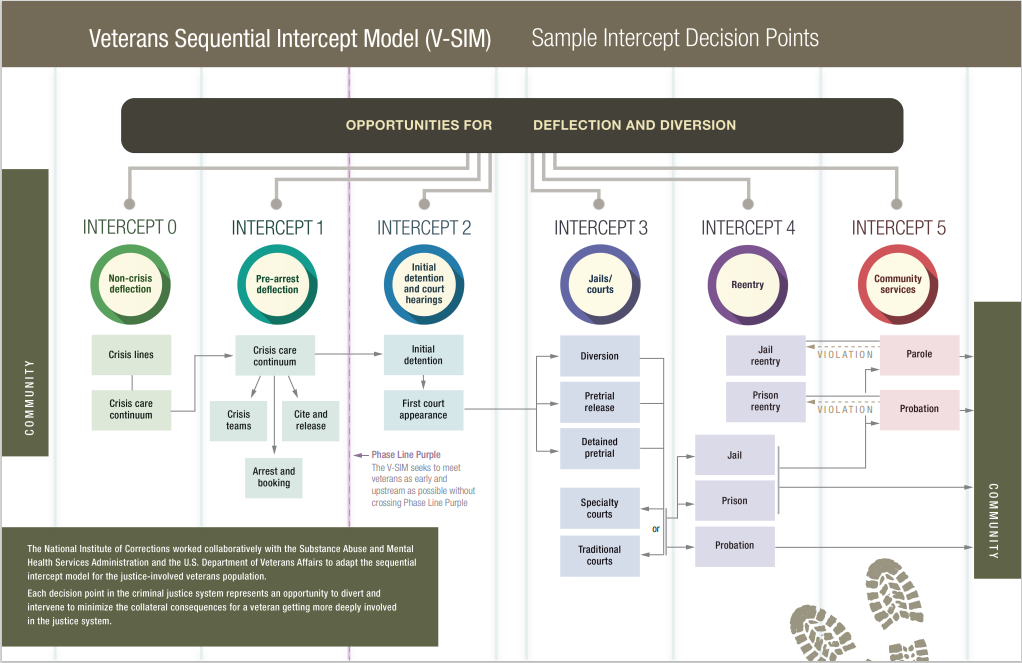Contact Us
To provide feedback on the Community Policing Dispatch, e-mail the editorial board at CPDispatch@usdoj.gov.
To obtain details on COPS Office programs, publications, and resources, contact the COPS Office Response Center at 800-421-6770 or AskCopsRC@usdoj.gov

U.S. Department of Justice
Office of Community Oriented Policing Services
Washington, DC 20530
The vast majority of military veterans are law-abiding citizens following their active-duty military service. However, because of the unique experiences of those serving in the military, some come home and struggle to adapt to civilian life after their military service ends. Some deal with service-related mental and or physical health issues or substance use issues. These issues can contribute to justice system involvement for some veterans. The first formal veterans’ treatment court started in Buffalo, New York, in 2008, presided over by Judge Robert Russell. This initial program has inspired many efforts across the spectrum of justice, such as veteran-focused crisis intervention training among law enforcement officers, veteran-specific sentencing mitigation, and veterans housing units in prisons and jails, along with numerous other creative targeted efforts.
As a center of learning, innovation, and leadership that shapes and advances correctional practice and public policy, the National Institute of Corrections (NIC) continues to address the critical needs of justice-involved veterans and the professionals who work with them.
In 2016, the NIC established the Justice Involved Veterans Network (JIVN). The JIVN is a collaboration with all divisions at NIC—including the Academy, Community Services, and Jails and Prisons divisions—and with federal partners at the U.S. Department of Veterans Affairs, the Substance Abuse and Mental Health Services Administration (SAMHSA), the Office of Community Oriented Policing Services (COPS Office), the U.S. Department of Defense, and the Federal Bureau of Prisons. The JIVN also includes representatives from local, state, and federal agencies from across the spectrum of justice that specifically work with justice-involved veterans. The network’s primary mission is to develop innovative and holistic approaches to assist justice-involved veterans and to improve outcomes for those veterans who become involved in the criminal justice system.
The JIVN has been working for the last several years to develop a series of resources, including adapting the SAMHSA GAINS Center’s Sequential Intercept Model (SIM) to the justice-involved veterans population. The JIVN has called this new model the Veterans Sequential Intercept Model (V-SIM). The SIM delineates interventions at distinct stages of the criminal justice system that have been recognized to address the needs of persons with mental illness. NIC has developed a series of resources and webinars for those dedicated to the advocacy and care of justice-involved veterans for each of the intercepts from Intercept 0 to Intercept 5.
The organizational structure of resources for veteran-specific considerations to traditional intercept points, are listed here.
- Intercept 0. Community Services: Non-Crisis Deflection
- Intercept 1. Law Enforcement and Emergency Services: Pre-Arrest Deflection
- Intercept 2. Initial Detention and Court Hearings: Early Identification of Veteran Status in Detention or Court Settings
- Intercept 3. Jails/Courts: Opportunities for Clinical Services and More Intensive Supervision
- Intercept 4. Reentry: Preparing for Reentry with Responsive Services
- Intercept 5. Community Services: Identifying and Addressing Veterans Needs through Assessment and Case Planning

There are several V-SIM resources available for jurisdictions implementing veteran-specific programming:
- Baldwin, Julie Marie, and Lillian Tuttle. Veterans Reentry Programming: Supporting Transition to Civilian Life Across the Sequential Intercept Model. Washington, DC: National Institute of Corrections, 2022. https://s3.amazonaws.com/static.nicic.gov/Library/033668.pdf.
- Four-Part Webinar Series: Veteran Intercepts in the Criminal Justice System:
- Part 1. Veteran Intercepts in the Criminal Justice System: Introduction and Overview of the Veteran Sequential Intercepts 0–5.
- Part 2. Veteran Intercepts in the Criminal Justice System Webinar Series: Intercepts 0–1.
- Part 3. Veteran Intercepts in the Criminal Justice System Webinar Series: Intercepts 2–3.
- Part 4. Veteran Intercepts in the Criminal Justice System Webinar Series: Intercepts 4–5. COMING SOON.
- Infographic and resources at NIC’s website, Justice-Involved Veterans.
We are hopeful that these resources and examples of success can inspire agencies across the spectrum of justice to identify champions, create or improve upon existing programs, and provide the necessary resources and opportunities for our veterans to find their sense of purpose and become productive members of society.
All of NIC’s veteran-specific resources mentioned in this article can be found on NIC’s Justice Involved Veterans Microsite.
Subscribe to Email Updates
To sign up for monthly updates or to access your subscriber preferences, please enter your email address in the Subscribe box.






